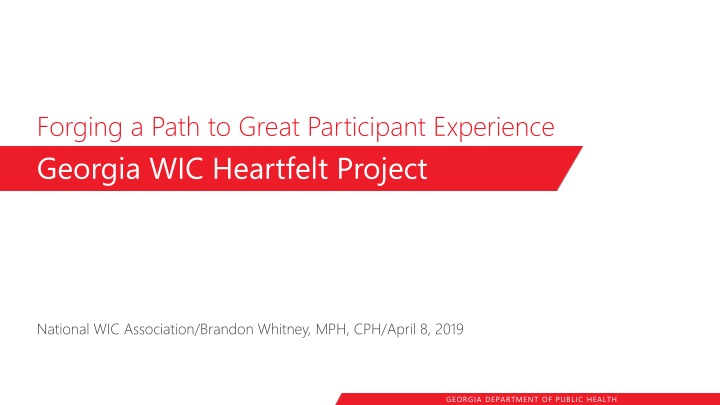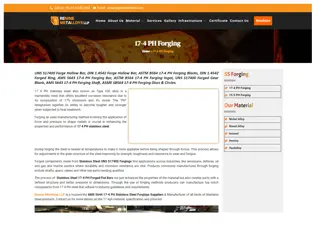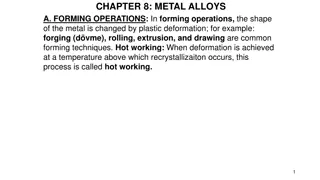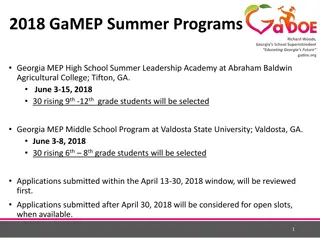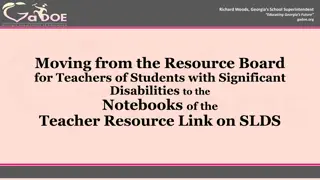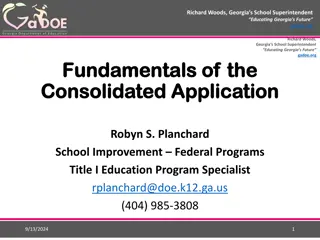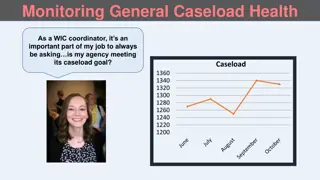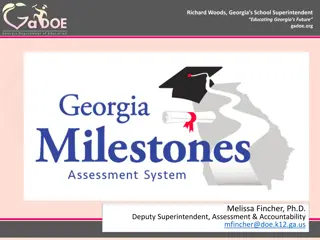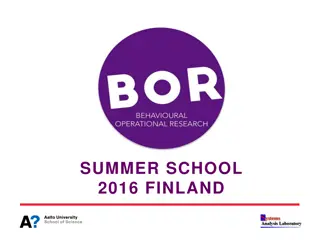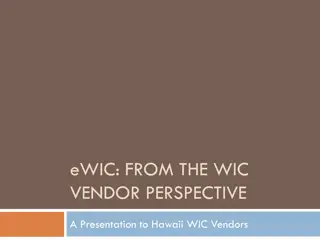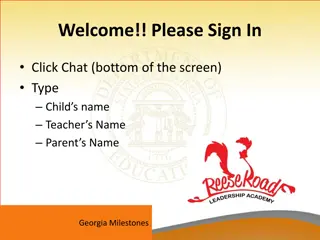Forging a Path to Great Participant Experience in Georgia WIC
On the Heartfelt Project by Georgia WIC addressing participant concerns, survey process for evaluating satisfaction, and training curriculum for supervisor coaching skills. Overview of Georgia WIC, priorities, and focus on participant satisfaction. Best practices for service excellence and progress on the Heartfelt Project with USDA Operational Adjustment Grant.
Download Presentation

Please find below an Image/Link to download the presentation.
The content on the website is provided AS IS for your information and personal use only. It may not be sold, licensed, or shared on other websites without obtaining consent from the author.If you encounter any issues during the download, it is possible that the publisher has removed the file from their server.
You are allowed to download the files provided on this website for personal or commercial use, subject to the condition that they are used lawfully. All files are the property of their respective owners.
The content on the website is provided AS IS for your information and personal use only. It may not be sold, licensed, or shared on other websites without obtaining consent from the author.
E N D
Presentation Transcript
Forging a Path to Great Participant Experience Georgia WIC Heartfelt Project National WIC Association/Brandon Whitney, MPH, CPH/April 8, 2019 GEORGIA DEPARTMENT OF PUBLIC HEALTH
Objectives Summarize two components of the Heartfelt Project that were used to address participant concerns in Georgia WIC Describe the survey process that Georgia WIC used to evaluate participant satisfaction and the results it produced Outline the training curriculum that was developed to improve supervisors' coaching skills GEORGIA DEPARTMENT OF PUBLIC HEALTH
WIC Background GEORGIA DEPARTMENT OF PUBLIC HEALTH
Georgia WIC Overview 19 WIC Local Agencies: 18 Public Health Districts + 1 contract agency Health districts are independent. o Shared public health governance 200,000 WIC participants 198 WIC clinics (159 counties) 1300 WIC-authorized vendors Planning/implementing eWIC (EBT) o GEORGIA DEPARTMENT OF PUBLIC HEALTH
Georgia WIC Priorities eWIC implementation Breastfeeding Nutrition counseling Language Nutrition Caseload decline Funding Integrated Eligibility System Staff turnover GEORGIA DEPARTMENT OF PUBLIC HEALTH
Why Focus on Participant Satisfaction? Staff Participant Care Complaints Satisfaction Quality Improvement Public Health Accreditation Caseload GEORGIA DEPARTMENT OF PUBLIC HEALTH
Best Practices for Service Excellence Leadership Hiring Techniques Training Practices Cultural Climate Organizational Courtesy Employee Empowerment Seamless Service Management of Discourteous Service Performance Measures Customer Loyalty From World Class Courtesy Best Practice Report - http://govinfo.library.unt.edu/npr/library/papers/benchmrk/courtesy/chapter1.html GEORGIA DEPARTMENT OF PUBLIC HEALTH
Heartfelt Project: Progress to Date USDA Operational Adjustment Grant Customer service training o ServiceSkills.com o Increased frequency and quality Promotional branding/tagline Data collection/evaluation Supervisory skills training GEORGIA DEPARTMENT OF PUBLIC HEALTH
Exploratory Evaluation GEORGIA DEPARTMENT OF PUBLIC HEALTH
Methods: Active Participant Survey Conducted in-person at 39 purposively selected clinics (July-November 2017) o Included a mix of large and small clinics Interviewers asked two questions: 1. On a scale of 1 to 5 (with 5 being completely satisfied ), how satisfied are you with the services you received at today s WIC visit? 2. What could we have done to improve your experience? GEORGIA DEPARTMENT OF PUBLIC HEALTH
Methods: Inactive Participant Survey Conducted over phone with participants who failed to pickup vouchers for two months, or failed to recertify (but were still categorically eligible) Interviewers followed a brief series of steps to record a response: 1. Ask: What is your reason for not returning for WIC vouchers? 2. Record responses directly into predefined categories 3. Ask clarifying follow-up questions based on the participant s initial response After responding, respondents were offered opportunity to return to WIC GEORGIA DEPARTMENT OF PUBLIC HEALTH
Methodological Notes Qualitative methods were included because they are useful for understanding Why? and How? Methodical data collection and analysis, but not based solely on numbers Unit of measure is information, not necessarily an individual. Samples may not be statistically representative. Allows more inclusion of uncommon cases (e.g. small clinics, participants with barriers) o o o GEORGIA DEPARTMENT OF PUBLIC HEALTH
Methodological Notes (cont.) Analysis included coding responses based on themes (using NVivo for Windows). This process was performed by two people for validity. Incorporated both surveys along with external data and knowledge to tell the story of the data and draw theories/conclusions GEORGIA DEPARTMENT OF PUBLIC HEALTH
Summary of Results: Active Participants Total surveys: 1,322 Average score: 4.5 Most common score: 5 (67% of responses) o Commonality of 5 may be more reflective of our methods 9 local agencies had at least one participant that rated their experience 1 GEORGIA DEPARTMENT OF PUBLIC HEALTH
Summary of Results: Inactive Participants Issue Number of Responses 2304 1034 379 211 187 179 76 66 32 13 7 411 Percent of Responses 100% 44.9% 16.4% 9.2% 8.1% 7.8% 3.3% 2.9% 1.9% 0.6% 0.3% 17.8% All Responses Unintentional Missed Appointment Work/School Conflict No Longer Needed Moved Transportation Foods/Formula Believed Ineligible Clinic Wait Time Shopping Issues Employee Courtesy Other GEORGIA DEPARTMENT OF PUBLIC HEALTH
Discussion: Missed Appointments Issue Number (Percent) of Responses 379 (16%) 258 (11%) Note Work/School Conflict Forgot ~Half reported being too busy for WIC Appointment itself or to reschedule the appointment Temporary illnesses only, chronic conditions/disabilities were different. Sometimes the child alone was sent to visit family Includes didn t realize appointment was missed, or was denied service at clinic Calls/voicemails to clinic go unanswered Some believed this permanently disqualified them. Most miscarriages assumed they were no longer eligible, without speaking to clinic staff. Illness/Death in Family 176 (8%) Travel 119 (5%) Appointment Trouble 86 (4%) Clinic Phone Issues Lost Folder/Vouchers 54 (2%) 50 (2%) Miscarriage or Death 38 (2%) GEORGIA DEPARTMENT OF PUBLIC HEALTH
Discussion: Wait Times Most commonly cited area among active participants (referred to 640 times) o Many participants expressed a positive (or not-as-negative ) response. Among inactive participants, uncommon reason for not participating o 32 responses (2% of total) Wait time may be a root cause for non-participation: Not the first reason participants provide but an underlying factor (that they may consider unchangeable) o Revealed in deeper interview of inactive participants GEORGIA DEPARTMENT OF PUBLIC HEALTH
Discussion: Courtesy and Communication Courtesy is a key theme of importance to active participants, although it was not a common reason for non-participation (only seven mentions). o Most references among active participants were positive. o In both surveys, courtesy was usually cited along with other issues/themes . o This is another underlying reason for non-participation, clarified in a deeper interview. Courtesy was sometimes inextricably linked to communication. o Misinformation = rudeness GEORGIA DEPARTMENT OF PUBLIC HEALTH
Discussion: Courtesy and Communication (cont.) 116 instances (from both surveys) of correctible clinic issues o Mostly include policy misunderstandings in clinic, or simply poor service 100 instances (from inactive survey) where education or assistance to the participant could have mitigated their personal barriers. o Improved service helps participants navigate the program. GEORGIA DEPARTMENT OF PUBLIC HEALTH
Discussion: No Longer Needed Mentioned by 211 inactive participants (9%) Most commonly due to raises in income or custody changes Participants often indicated they only planned to receive WIC temporarily (during infancy or maternity leave). Questions to consider: 1. How can WIC convince these families to stay (if they are eligible)? 2. How can WIC better help families, regardless of when the enter or exit the program? The key to both may be maximizing our program benefit: strong nutrition education and program information. GEORGIA DEPARTMENT OF PUBLIC HEALTH
Discussion: No Longer Needed (cont.) Rational Choice Theory suggests participants consider costs and benefits to WIC participation. After a time, costs become too high for the benefits. Improved service can tip the scale by helping participants take full advantage of the program. This may help participants stay on WIC longer, and enrich their experience while they are participating. GEORGIA DEPARTMENT OF PUBLIC HEALTH
Actions Taken 1. Presented summary findings to local agency directors, along with the following recommendations: o Prioritize addressing barriers and maximizing the benefit for each participant: i. Provide quality nutrition education and program explanations. Short- changing the participant creates barriers, minimizes the participant benefit, and hurts our program goals. ii. Begin outreach and callbacks by asking participants Why? You may be surprised how helpful you can be 2. Provided each local agency a summary of survey findings from their agency, including recommendations for further study and action GEORGIA DEPARTMENT OF PUBLIC HEALTH
Actions Taken 3. Began quality improvement project to address clinic wait times o Providing clinics structured, sustainable, consultative support o Includes aim to decrease time spent performing tasks not adding to participant benefit o Receiving training and support from Public Health Foundation and Georgia Department of Public Health- Office of Quality, Performance, and Accreditation GEORGIA DEPARTMENT OF PUBLIC HEALTH
Actions Taken 4. Began project to improve service related to appointment scheduling o Altered a local agency s phone center process to ask Why were you unable to make your WIC appointment? o Responses are documented and tracked for quality improvement. o Examples of results: High frequency of missing documentation in 2 clinics High frequency of MD appointment conflicts in 1 clinic Agency-wide work conflicts due to varying work schedules o Pending completion of evaluation, will suggest model to other local agencies GEORGIA DEPARTMENT OF PUBLIC HEALTH
Actions Taken 5. Planned project to identify and address barriers to voucher redemption o Pilot will be in the lowest redeeming local agency in the state o Utilizing public health intern to create materials and collect data o Includes clerical and CPA components: Clerks- identifying participants that have not redeemed vouchers and discussing their barriers CPAs- nutrition education curriculum focused on under-redeemed foods o Pending completion of evaluation, will be recommended to other local agencies with low redemption. GEORGIA DEPARTMENT OF PUBLIC HEALTH
Heartfelt Supervision: Coaching for Success GEORGIA DEPARTMENT OF PUBLIC HEALTH
Program Overview Optional monthly videoconference trainings for WIC supervisors and leaders Developed with assistance from DPH Human Resources Created to be convenient in busy environment 30 minute trainings, repeated three times per day Focus is on simple soft skills, not policy or disciplinary procedure. Developed SharePoint resource page for trainings and materials o GEORGIA DEPARTMENT OF PUBLIC HEALTH
Content Example: Why Engage? This training focused on defining the levels of engagement and encouraging supervisors to be engaged. Remember: A manager s level of engagement directly influences the employee s engagement! Actively Disengaged, 16% Engaged, 33% If you look after your staff, they ll look after your customers. It s that simple. -Richard Branson, founder Virgin Group Not Engaged, 51% Data Source: Gallup. State of the American Workplace 2016 GEORGIA DEPARTMENT OF PUBLIC HEALTH
Content Example: Engagement Methods This training provided more tips for supervisors to engage their staff. Incorporate get to know you team activities into meetings. Practice Management by Walking About (MBWA). Set clear expectations for minimum and advanced performance. An employee is far more likely to be engaged when they have clear performance expectations, the tools to do their job well and a manager who cares about them as a person (rather than just an economic unit of production ) and communicates effectively with them. - Ross Clennett, Recruitment Coach GEORGIA DEPARTMENT OF PUBLIC HEALTH
Content Example: Communication This training provided tips on how to communicate with staff. Determine your employees preferred communication style. Be trustworthy and honest. Pause before responding; don t just hear- listen. Communication is a skill that you can learn. It s like riding a bicycle or typing. If you re willing to work at it, you can rapidly improve the quality of every part of your life. Bryan Tracy, Motivational Speaker GEORGIA DEPARTMENT OF PUBLIC HEALTH
Content Example: Employee Development This training provided examples of how supervisors can develop and reward their staff. Work with your team to identify professional development goals and opportunities. Make a habit of expressing appreciation. Reward behaviors you want to see more of. When you become a leader, success is all about growing others. - Jack Welch, former CEO of GE GEORGIA DEPARTMENT OF PUBLIC HEALTH
Heartfelt Service Lesson Plan ~30 minute interactive overview of Heartfelt service and tagline Framed as a team discussion facilitated by supervisors Learning objectives: o Describe the ways to provide Heartfelt service o Identify the connections between Georgia WIC performance standards to Heartfelt service Upon completion, staff are provided promotional cups. GEORGIA DEPARTMENT OF PUBLIC HEALTH
Heartfelt Service Lesson Plan (cont.) Rather than completing a post-test, employees completing the training were asked to creatively show how they will commit to providing Heartfelt service. GEORGIA DEPARTMENT OF PUBLIC HEALTH
Conclusion GEORGIA DEPARTMENT OF PUBLIC HEALTH
Heartfelt Service is Warm, Helpful, and Kind Despite many competing program priorities, Georgia WIC remains dedicated to devoting immediate attention to participant satisfaction. This will be achieved by: o Continuing to explore new ways to utilize participant-facing data for small and large-scale program improvements o Creatively designing and implementing resources to engage supervisors and staff o Encouraging and modeling high quality, Heartfelt service with internal and external customers GEORGIA DEPARTMENT OF PUBLIC HEALTH
What Questions Do You Have? GEORGIA DEPARTMENT OF PUBLIC HEALTH
Contact Information Brandon Whitney, MPH, CPH Manager of Planning & Strategic Partnerships Georgia WIC Program Phone: 404.657.9002 Email: Brandon.Whitney@dph.ga.gov Coauthors Sharon Joseph, MPA, CLC Regional Advisor Georgia WIC Program Barbara Stahnke, MEd, RD, LD Advisory Team Manager Georgia WIC Program GEORGIA DEPARTMENT OF PUBLIC HEALTH
THANK YOU! GEORGIA DEPARTMENT OF PUBLIC HEALTH
